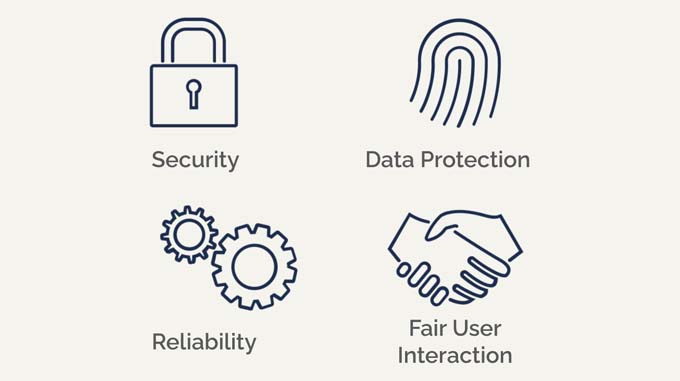Top risks: Cyber is the main concern in companies
According to the 11th Allianz Risk Barometer, cyber threats are the biggest concern for businesses worldwide. The threat of ransomware attacks, data breaches or IT outages worries companies even more than business and supply chain disruptions, natural disasters or the Covid 19 pandemic.

Almost every day we read in the media about cyberattacks by criminals that cause considerable damage and even lead to production losses. Companies are increasingly afraid of becoming victims of such attacks themselves. This is also shown by the eleventh Allianz Risk Barometer, for which around 2,700 experts in 89 countries and territories worldwide were surveyed on top risks. Respondents included CEOs, risk managers, brokers and insurance experts. For example, cyber incidents are the top risk for businesses worldwide (44 % of responses), business interruption ranked second globally (42 %), while natural catastrophes jumped to third (25%, up from 6th last year). Climate change concerns also made a big leap forward to 6th place (17%), up from 9th place last year). The outbreak of a pandemic, on the other hand, seems to have lost some of its terror, at least in terms of its impact on the economy: it fell out of the top 3 to 4th place (22%). However, the survey took place before the outbreak of the Omikron variant, Allianz spokesman Daniel Aschoff noted in a media briefing. He did not rule out that the result would be somewhat different in view of the current pandemic situation.
Resilience is becoming a competitive factor
Naturally, the risks are assessed somewhat differently depending on the sector. However, it is noticeable that business interruptions were named as the No. 1 risk globally in more than half of the industries surveyed (in 11 out of 20 sectors), while cyber ranked top in "only" five out of twenty industries. "Business disruption is likely to remain the most important risk issue in 2022," said Christoph Müller, CEO of AGCS, summarizing this year's survey. "For most companies, the biggest fear is not being able to manufacture their products or provide their services. In 2021, disruptions occurred on an unprecedented scale, caused by a variety of triggers: Crippling cyberattacks, the impact of numerous climate change-related weather events on the supply chain, and pandemic-related production problems and transportation bottlenecks wreaked havoc. This year promises only a gradual easing of the situation, although further problems related to Covid-19 cannot be ruled out. Building resilience to the many causes of business disruption is increasingly becoming a competitive advantage for companies." According to the Euler Hermes Global Trade Report, further disruptions in the global supply chain are expected to continue into the second half of 2022.
Top risks in Switzerland: cyber in first place
In Switzerland, the ranking is also dominated by cyber incidents (1st place with 61%) and business interruption (2nd place with 57%). Market changes, for example caused by volatility, increased competition/new competitors, stagnating markets or market fluctuations (25%), follow in third place. According to Allianz, uncertainty at the political level is also likely to play a role here: The lack of a framework agreement with the EU, unresolved problems in connection with Brexit or even monetary policy would lead to a kind of "feeling of powerlessness" in companies, as Christoph Müller explains.

The biggest climber alongside market changes is climate change (5th place with 17 %). New in the top ten ranks of top risks are the shortage of skilled workers, which ranks 7th (12%), as well as concerns about the failure of critical infrastructure (9th place with 11 %) and loss of reputation (9th place with 11 %). Worries about Covid-19 or another pandemic are of significantly less concern to companies than they were in 2021 (6th place with 15%).
New criminal tactics
In the context of cyber risk, Christoph Müller sees "double extortion tactics" as particularly worrying: Increasingly, cyber criminals are not only limiting themselves to extorting ransoms after data has been encrypted, but are also subsequently threatening to publish sensitive data if payment is not made again. And further, the cyber threat goes hand-in-hand with military threats, as recent events in Ukraine, for example, would show, Mueller said. "Ransomware has become big business for cybercriminals, who are refining their tactics and lowering the barriers to entry - it hardly takes any technical knowledge to carry out an attack, and the relevant tools can be conveniently booked on the web. The commercialization of cybercrime makes it easier to exploit vulnerabilities on a large scale. We will see more attacks on supply chains and critical infrastructure," explains Ivo Heeb, Underwriting Expert Financial Lines at AGCS in Switzerland.
Business interruption: the constant among the top risks
In a year marked by widespread disruption, the extent of vulnerabilities in modern supply chains and production networks is more apparent than ever. In addition to cyber incidents, the impact of companies' increasing reliance on digitalization and the shift of work to remote locations are also important causes. Natural disasters and pandemics are the other two important triggers for business interruption, according to respondents. "The pandemic highlighted the extent of interconnectedness in modern supply chains and how inherently unrelated events can come together to cause widespread outages. For the first time, the resilience of supply chains has been severely tested on a global scale," says Christoph Müller, CEO of AGCS in Switzerland.
The outbreak of a pandemic remains a major concern for companies. In Switzerland, however, as mentioned above, the threat now ranks only 6th among the top risks. Although the Covid 19 crisis continues to overshadow the economic outlook in many sectors, companies believe they are well prepared for it. The majority of respondents (80 %) believe they are adequately or well prepared for a future wave of pandemics. Improving business continuity management is seen as the most important measure that companies are taking.
Source and further information: www.agcs.allianz.com









